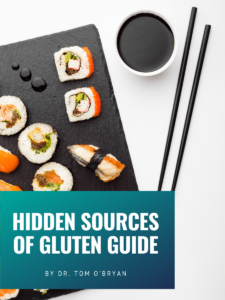You’re trying so hard to be healthy, right? But if avoiding gluten is one of your objectives, you need to know that it’s possible, and even likely, for vitamins and supplements to contain trace and higher amounts of gluten.
You can protect yourself by learning how to evaluate the ingredients in these products!
One of the most common surprising food sources of gluten is in starch, most commonly derived from wheat, but also from corn, potato, tapioca, or sometimes a combination of these.
When trying to protect yourself from possible gluten in supplements or vitamins, you are best advised to be on the lookout for wheat starch first.
If you’ve ever attempted to obtain information from a manufacturer on their excipients (ingredients used on the inside or outside of any vitamin or supplement pill or capsule), you know that it is near impossible to glean.
To get the list of Possible Gluten Contaminated Ingredients in Supplements, click here.And even if you do succeed in getting the information, there is no guarantee that it is complete or true because there is no law that mandates drug manufacturers to disclose their sources. AND the information they give you today, could prove to be inaccurate next month if they change their processing or sourcing.
So as a conscientious consumer, how are you to REALLY be protected?
How do you educate yourself on the contents of vitamins or supplements when it is so difficult to get true and reliable information from the manufacturer?
The power lies with youBy simply looking at the list of ingredients, you can get a pretty accurate answer on whether or not a vitamin or supplement is gluten-free. So don’t skip that step. Because about 10% of GF flour and starches have been found to contain gluten at levels high enough to be a problem, it is almost impossible to be completely GF when you eat out , or cook at home.
And don’t stop searching out answers, even though it may not be perfect!
Remember, if you take your supplements with food, and use E3 at every meal, it will help protect you from accidental trace gluten exposure. And if you take your supplements away from food, take an E3. Click here to get some powerful information on E3 and why it works.Here are a few vocabulary words you can use as reference for your research:
- Dextrins – Result from the hydrolysis of starch by heat or hydrochloric acid (from corn). It can also be obtained from wheat, rice or tapioca.
- Dextrates (when source is not specified).
- Dextri-maltose (when barley malt is used).
- Maltodextrin – A starch hydrolysate that is usually obtained from corn but can be extracted from wheat, potato or rice.
- Modified Starch (when source is not specified).
- Pregelatinized Starch – A starch that has been chemically or mechanically processed. The starch can come from corn, wheat, potato or tapioca.
- Sodium starch glycolate – A starch that is usually obtained from potato but many come from any starch source.
(Practical Gastroenterology January, 2007, pages 58-64)
Health is the only investment that pays us back in TIME.
Be well,
Dr. Tom O’Bryan, DC, CCN, DACBN
PS: How supplements are sourced is vitally important. Consider using TheDr.com’s supplement store for your family’s healthcare journey. https://store.thedr.com/products-a-z/




